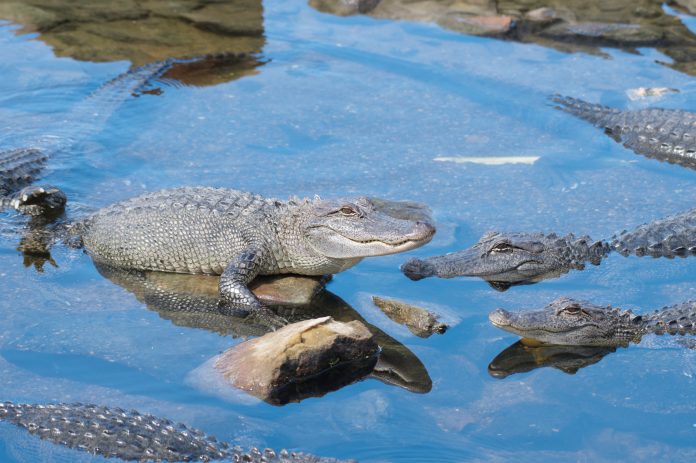
SOUTH PADRE ISLAND — One of the surest ways to kill an alligator, eventually, is to start feeding it.
Herpetologist Jake Reinbolt made a passionate case against the practice last week at the 26th annual Winter Outdoor Wildlife Expo at the Hilton Garden Inn.
Reinbolt transferred last September from Gator County Louisiana in Natchitoches to the Island to supervise alligators and other reptiles at the South Padre Island Birding and Nature Center and Alligator Sanctuary.
“Once an alligator is fed by a person just one time, they do not forget,” he said. “Alligators are like husbands, cats and kids — you give them lunch, and they ain’t going away.”
There are about seven million American alligators today, a remarkable conservation success story seeing they were almost hunted to extinction in the 1950s and 1960s.
Of those, an estimated one million are in Texas, with about 20,000 to 25,000 in the Rio Grande Valley, their numbers here limited by the availability of fresh water.
“Alligators, wild alligators, want absolutely nothing to do with people. They do not see us as prey; they do not see us a food; they don’t see us as a source of food,” he said. “Wild alligators, we almost hunted them to extinction in the 20th century, and they see us as predators, not prey.”
Fines, fatalities
Texas Game Wardens warn that feeding an alligator is a Class C misdemeanor in Texas, with fines ranging up to $500.
“If you’re out there fishing or swimming, doing whatever you’re doing, and you come across a wild alligator, it’s going to do one of three things,” Reinbolt said. “Option one, it’s going to sit as still as it possibly can and pray to God you don’t see it. Option two, it’s going to get under the water and take off as fast as possible. Option three, some of the more confident animals, or the ones that feel cornered, especially, actually puff their backs out of the water.”
He said the only time this behavior changes is when a mother alligator is protecting her nest and young — or when an alligator is fed and associates humans with food.
“There’s one point I try to drive home to every person I give these talks to,” Reinbolt said. “I don’t care how cool you think you look doing it, I don’t care who you’re trying to impress, do not feed wild alligators. And if you care about your family and friends, do not let them do it, either. It’s not worth it for you or anyone else involved, including the alligators.”
Alligators are like husbands, cats and kids — you give them lunch, and they ain’t going away.
The consequences can be deadly.
“You remember what happened in Disney a couple of years ago involving an alligator?” he said. “In case you’re not familiar, there were two parents and 2-year-old boy, walking by the water in Disney, supposedly the happiest place on earth. A seven-foot alligator came out of water, grabbed that kid, pulled him in, and drowned him.”
“My boss sits on the board, and whenever there’s an alligator attack they do a little work with the gators,” he added. “In the case of the Disney incident … what do you think we found? Two employees of Disney going out every single day on their lunch breaks and feeding that alligator. It’s rarely the person feeding the alligator who gets hit.”
Problem gators
All of the 50 or so alligators at the SPI Birding and Nature Center are problem gators, which have become habituated to humans, many of them because they were being fed.
They range from three feet to nearly six feet and are kept there until they reach breeding age, then are transferred to other facilities like the one in Natchitoches.
Reinbolt said it’s the only way to keep the peace since they become much more aggressive with each other once they reach mating age.
Yet those at the sanctuary are the lucky ones.
“Early retirement. And they’ll be a king or queen for the rest of its life,” he said. “Unfortunately, in several other states, Louisiana being a very good example, they don’t believe in that kind of nuisance program.”
“They only see one way to deal with a problem alligator, and that’s a bullet to the head,” he added. “You’re not doing an alligator a favor by feeding it. The other reason you don’t want to do that is you’re setting someone else up for failure.”
To learn more about alligators, the SPI Birding and Nature Center hosts “Gator Talks” daily at 11 a.m., 1:30 p.m. and 3:30 p.m.



